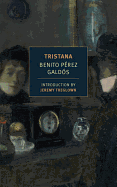
Considered the Spanish Charles Dickens, Benito Pérez Galdós (Fortunata and Jacinta) wrote more than 70 novels. Inexplicably, his writings are almost entirely unavailable in English translation. New York Review Books is working to remedy that situation with Margaret Jull Costa's fine new translation of Galdós's dark 1892 shocker, Tristana. This 166-page gem is frequently modern in its frank, earthy style as it cynically submits love and desire to merciless analysis, picking apart romantic delusions with scientific glee.
Don Lope Garrido, once a rich member of the highest social circles, now lives in cheap rented rooms. After depleting his fortune in a failed attempt to save his best friend, he becomes the guardian of his friend's beautiful orphaned daughter, Tristana; within two months he's taken her virginity. But Tristana is a free soul, a gorgeous, delightfully cheerful feminist a century ahead of her time who abhors marriage, refuses to surrender her independence and possesses a natural artistic sensibility. Scarcely 21, she appears to live with Don Lope like a niece or daughter. When she falls in love with a poor, angelically handsome young painter, her vigilant, despotic master threatens to teach her a lesson.
Much of the middle section of the novel is epistolary--the intoxicated correspondence between the two lovers--and here Galdós is at his most conventional. Soon, he completely turns the formula on its head in his daring and original conclusion that defies all romantic illusions. Uncomfortable moral complexity is Galdós's specialty, and the novel is a carefully constructed trap that springs shut on the reader in the last 30 pages. --Nick DiMartino, Nick's Picks, University Book Store, Seattle, Wash.

